


 |   |
| Project News | General Info | Screenshots | Downloads |
RPG Settings & Mechanics (Chapter Two)The "System" section describes the features of Project RPG.XLS role playing game from the non-technical perspective. |
RPG SkillsetThe skill and attribute system in RPG.XLS may be described as "compact but not simple". The number of attributes and skills is limited, but each statistic is meaningful and useful. The six attributes are Strength, Toughness, Agility, Perception, Willpower and Charisma. |
Instead of making system with dozens of skills, of which three are essential , five add flavor and remaining thirty-some are useless, I decided to limit the system to only 3 classes of three skills each. Combat skills include Melee, Bows and Throwing. Arcane skills include Spellcasting, Enchantment and Alchemy, and Rogue skills include Lockpicking, Detection and Negotiation. |
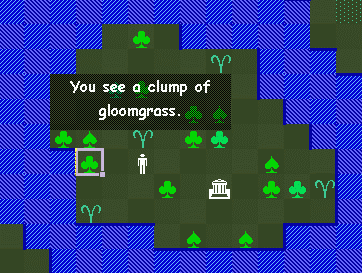 |
While the number of skills is limited, the strength of a given character will lie in developing a proper set of skills, as some actions to be efficient will require more than one skill. For example, most magic missiles are treated as throwing objects, so if someone want to master ranged magical combat, he should invest both in Spellcasting and Throwing skills. |
Additionally, for each five skill points accumulated in a given skill class, character may choose one special skills that gives substantial bonuses in various derived-statistics or tests. You will find such special skills like Missile Dodge, Warrior’s Scars, Mana Channeling, Sixth Sense or Peacemaker to name a few. |
Character DevelopmentThe game uses classless character system, allowing the player to build and develop a very customized character. Character creation will allow to make some meaningful choices, especially regarding the initial value of attributes, but I prefer for the major part of development process to take place during the actual gameplay. |
During the character progression player is able to both increase his attributes and skill, although skill progress significantly faster than attributes. It is the player choice to get specialized or rather follow "jacks of all trades" route - both approaches will have its strong advantages and disadvantages, and both will be playable. |
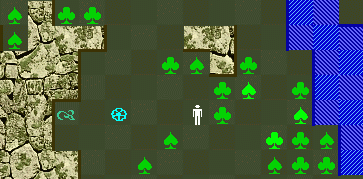 |
The progression system is based on experience points and levels, but experience will be granted in slightly different manner than in typical role-playing games. There will be no single experience point for slaying even a strong enemy, unless this action is a necessary part of the quest. Character will receive experience points for completing quests and for exploration, not for body count. |
For example, character receives the fixed amount of exp. for getting to the treasury, no matter how he did it - he can use brute force, persuade someone to get the permission, or use detection and lockpicking to get there via hidden unguarded passage. This system assures that "frontal assault" strategy is not an universal power-gaming choice. |
In many cases, brute force will be the least rewarding (although still available) option to solve the quest. On the other hand, due to the general "harsh" settings and scenario, the player should expect heavy combat form time to time. Simply saying, this is neither the world for pacifists, nor for the mindless axe-swingers. |
Combat SystemThe combat will be played on separate combat screens. This greatly simplifies the programming side and also allows to introduce some special strategic options. |
The combat system will be turn based, but with no action points. Most actions like moving to adjacent tile of melee attack will simply take one turn, some more complex actions like aimed shots may require two turns. The system, however, will by far more complex than simple "click to move, click to attack" mechanics. |
First, initiative, calculated on the basis on character attributes, special skills and circumstances plays very important role. It does not only determine the order of actions, but also initial placement of the character on combat area. The higher the initiative, the more options player will have to choose the initial position of the character in relation to his opponents. |
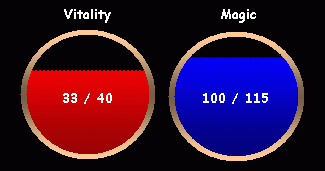 |
For example, the heavy armored "walking tank" would be able to start the fight directly near hostile spellcasters, to finish them quickly before they start messing with their nasty spells. Skilled archer could place himself at a distance, making possible to take down the enemies before they even have a change to reach him. |
Second, player will be able to choose the combat stance and the type of attack, making tradeoff between his general attack and defense ratings and between accuracy and damage for a particular attack. Archers could increase accuracy, damage or even armor penetration by choosing a slower aimed shots. |
The chance to hit is derived from comparing attacker’s attack rating to defender’s defense rating. Attack and defense statistics are basically computed from skills, attributes, and weapon bonuses. Combat skills are not mere accuracy modifiers. For example, melee skill contributes equally to attack and to defense ratings, and it even affects you vitality (since combat training makes you "tougher" overall). |
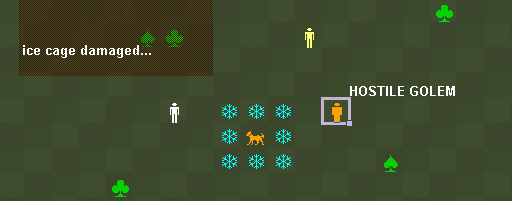 |
Third, each weapon will feature different bonuses to accuracy, defense, damage and velocity (high velocity increases the chance of knocking down the enemy, but also increased the chance of a wielder becoming imbalanced and vulnerable to attacks). The type of damage determines different efficiency against different armors and creatures - shooting arrows at skeleton makes little sense, but hammer could do a nice job. |
Enemies will differ one from another not only by the amount of damage they deal and the number of hit points. Many creatures will have unique abilities, special resistances and weaknesses and the attempt to use an unified strategy against all opponents would be very unwise. |
Finally, there is a lot of modifiers and fine-tuning rules: a chance of stunning/being stunned by a mighty blow, fighting multiple enemies at once results in defense penalties, bow becomes useless when enemy gets in melee range, heavy wounds decrease one’s performance in combat and so on... |
Magic SystemMagic is not uncommon and fairly popular, especially on basic levels. Spells are elemental based and either combat related (like the ultra-classic fireball) or utilitarian (like telekinesis). There are no spell levels, but some spells may require other prerequisite spells. Spellcasting skill affects the amount of mana points and the maximum number of spells you could learn. |
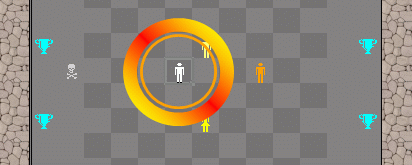 |
Alchemy allows you to produce different potions, elixirs and bombs. Potions and elixirs have usually healing or stat-boosting effects, bombs are used as throwing weapons. You will be able to collect alchemical ingredients in the wilderness either by harvesting plants of killing some creatures. Alchemy skill determines mostly the power of potions you can produce. |
Enchantment skill works in a rather original way. It determines the efficiency of focusing power through magically enchanted artifacts. The higher the skill, the more chargers you can cast from a wand or the greater bonus magical weapon will have in your hands. In other words, whether a sword is +3 or +5, depends not only on the magical weapon itself, but also on your enchantment skill. |
Religion plays an important role, priests do not offer utilitarian services, but rather provide guidance, prophecies and moral judgments. Temple quests are difficult, danger and do not offer significant mundane reward. But courageous believers will earn something more than gold: a providence. Providence is a hidden attribute that, while subtle and intangible, may prove very useful in many situations... |
 Excel is a registered trademark of the Microsoft Corporation®
|